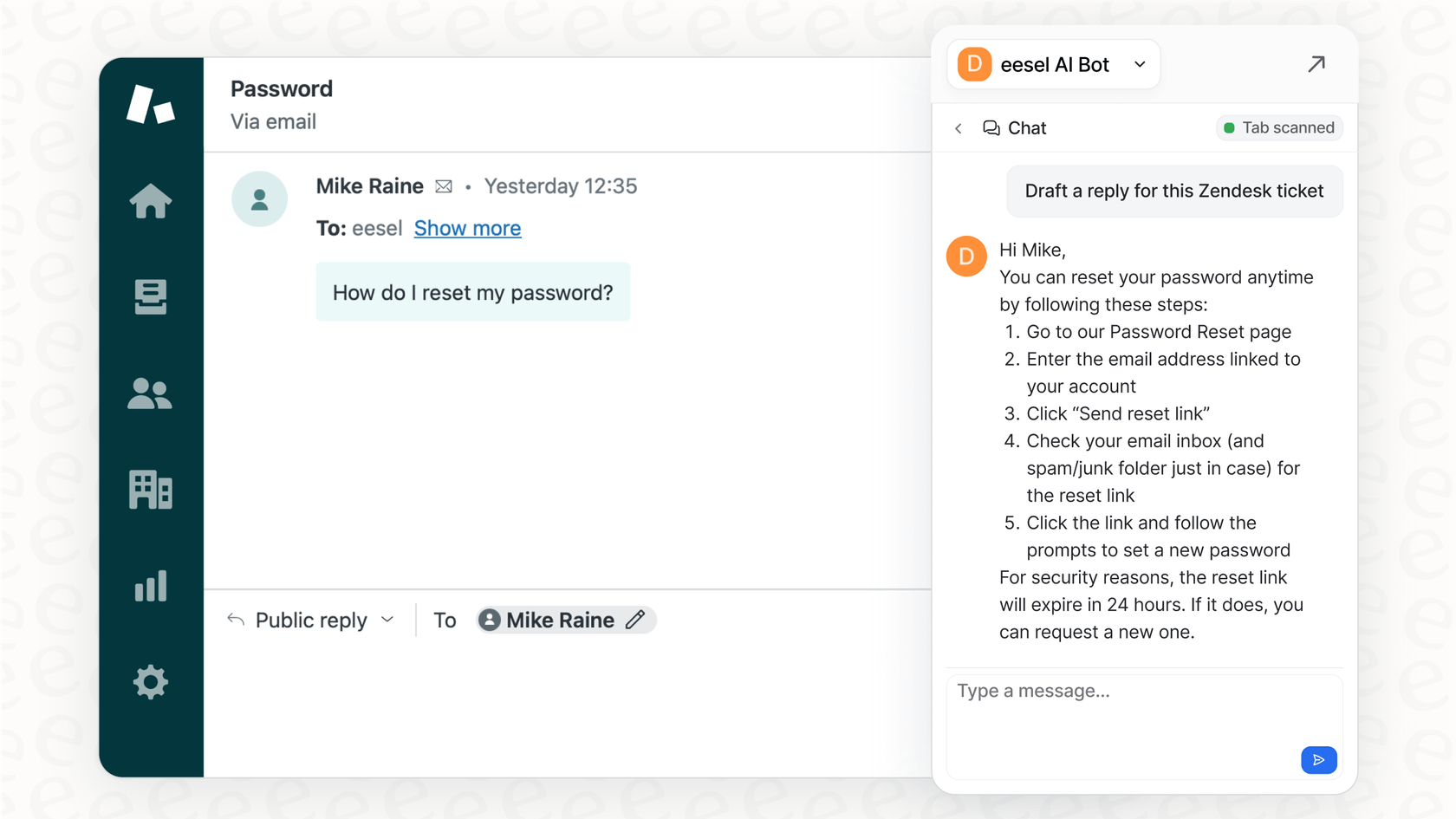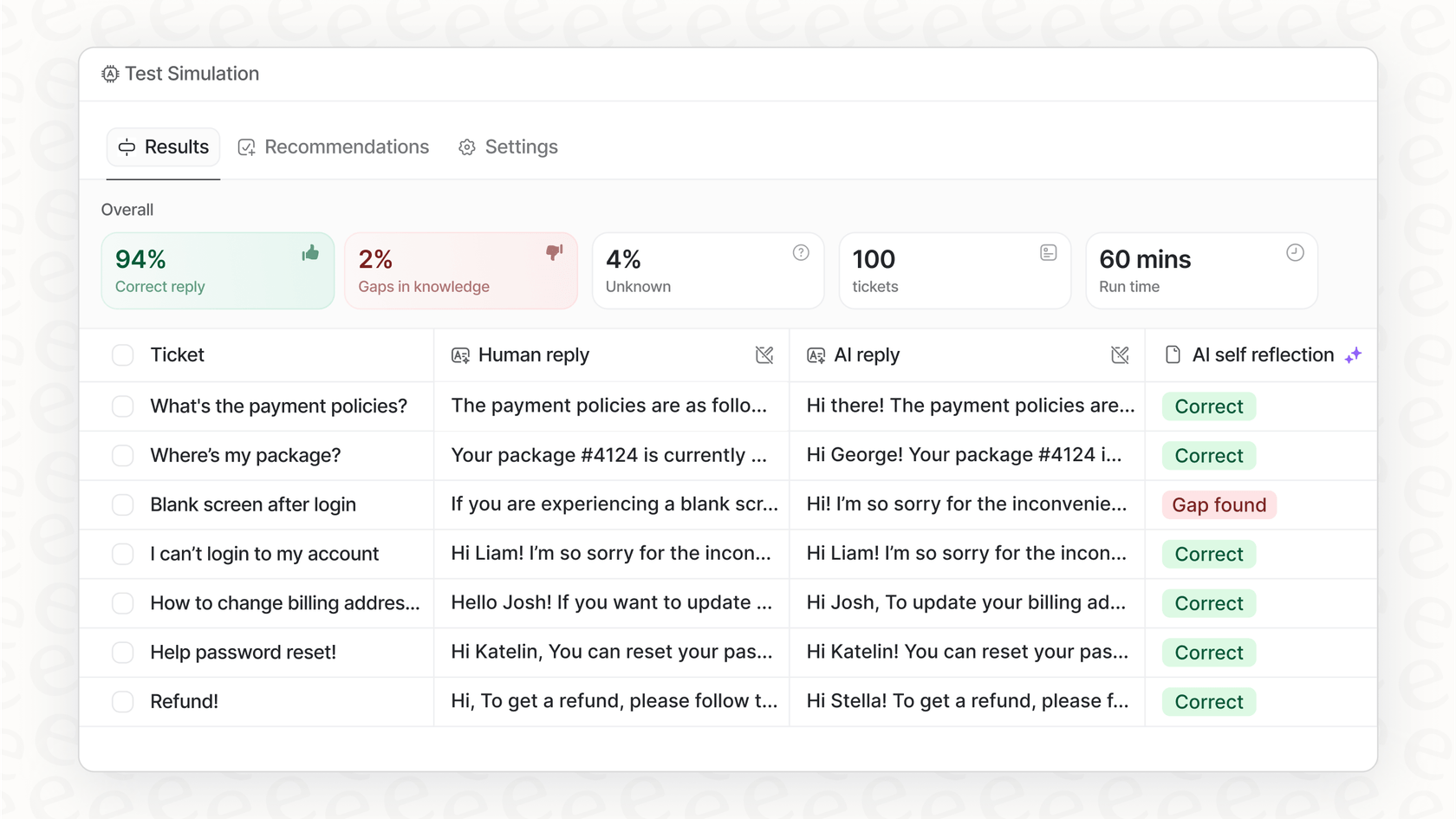Kustomer vs Help Scout: A 2025 comparison for support teams

Kenneth Pangan
Last edited September 28, 2025

Picking a new customer service platform can feel like you’re stuck between a rock and a hard place. On one hand, you need something that can handle all your customer conversations and data. On the other, you don’t want to give your team a tool that’s so complicated it takes months to get the hang of. It’s the classic tug-of-war between power and simplicity.
This is usually where the whole Kustomer vs Help Scout debate kicks off. They’re both well-known names in the support world, but they come at the problem from completely different angles. This guide is here to give you a straight-up, no-fluff comparison. We’ll look at their features, AI smarts, pricing, and what makes each one tick, so you can make a good call without having to sit through a dozen sales demos.
What is Kustomer?
Kustomer calls itself a "customer service CRM platform," and that "CRM" bit is everything. The whole idea behind Kustomer is to create one long, chronological timeline for every single customer. It pulls in conversations from email, chat, social media, and phone calls and lays them out right next to events like recent purchases or website visits.
This makes it a powerhouse for context. An agent can see a customer's entire history in one glance without jumping between different apps. It’s built for larger, fast-growing companies that are juggling a huge number of customer interactions and need one place to see it all. Its main strengths are its deep CRM features, its ability to handle any channel you throw at it, and an automation engine designed for complex, large-scale support.
What is Help Scout?
Help Scout is a different beast entirely. It’s a customer support platform built for a more personal, human touch. Instead of a complex dashboard full of data, its heart is a shared inbox that looks and feels just like an email client your team already knows how to use. This makes it incredibly easy for new agents to jump in and start helping customers from day one.
The platform is built around the philosophy of "conversations, not tickets." You won't find clunky ticket numbers or robotic language here; the goal is to make every customer interaction feel like a real conversation. It’s a favorite among small to medium-sized businesses that care more about building genuine relationships with their customers than tracking a million different data points.
Comparing Kustomer vs Help Scout: Three key differences
Before we get into the weeds, it’s worth saying that there’s no single "best" platform. The right one for you really boils down to your team's size, how much technical help you have on hand, and where you want your support team to be in a few years. To help you sort that out, we’ll compare them on three main things:
-
The core platform and how it feels to use it.
-
Their automation and AI capabilities.
-
Their overall philosophy and how they connect with other tools.
1. The core platform and user experience
Working in Kustomer is like looking at a rich, detailed customer timeline. It’s designed to give agents a complete picture by pulling every event, from purchases to past chats, into a single screen. The huge plus here is that agents have all the context they could ever need without switching tabs. The trade-off? All that information can be a bit of a firehose for new users. It often takes a fair bit of training and technical setup to get it running smoothly.
Help Scout, on the other hand, gives you a clean, collaborative inbox built for simplicity. It’s so straightforward that most agents can figure it out in an afternoon. The familiar layout makes it easy to assign conversations, leave private notes for teammates, and work together without stepping on each other's toes. The downside to this simplicity is that it doesn’t always have deep, contextual data from your other business tools. An agent can see the email thread, but they might have to pop over to Shopify to check a recent order or look up an account in another system.
Here's the thing, though. Both of these options ask your team to move to a whole new system. Migrating all your data, retraining your agents, and rebuilding your workflows from scratch is a massive project. But what if you could add more intelligence to the tools you already use? An AI copilot like eesel AI works right inside your current help desk, giving your team the context they need without the headache of a full platform migration.

2. Automation and AI capabilities
When you look at their AI, Kustomer and Help Scout are on different planets. Kustomer offers powerful AI agents that can chat with customers or help your reps, but these are almost always expensive add-ons to its already premium plans. Its automation tools are solid, letting you build out complex workflows, but you’ll likely need a dedicated admin or developer to actually build and maintain them.
Help Scout's AI is baked right into the platform, and some of its helpful features are even included in their free plan. It’s mainly designed to assist agents with things like summarizing long conversations or helping draft a quick reply. It's easy to use, but it's not really built to automate ticket resolution. You can't train it to solve common issues on its own or tell it to do custom things, like route a specific type of ticket to the right person.
It’s the classic trade-off: Kustomer's AI is powerful but expensive and complicated, while Help Scout's is simple but limited in what it can do.
There’s a more practical way to think about support AI. A tool like eesel AI lets you build and launch your own AI agent in minutes, not months. You get total control to decide exactly which tickets the AI should handle and what it's allowed to do, from looking up order details to escalating an issue to a specific agent.
Best of all, eesel AI takes the guesswork out of the equation. Its powerful simulation mode lets you test your AI on thousands of your past tickets. You can see the exact automation rate you can expect and the estimated cost savings before you ever turn it on for your customers. It’s a level of transparency you just don’t get with other platforms.

3. Platform philosophy and integrations
Kustomer's philosophy is pretty clear: it’s an all-in-one, "rip and replace" platform. It wants to be the central hub for every customer interaction you have. When you choose Kustomer, you’re basically committing to their entire ecosystem. This can be great for cutting down on the number of tools you use, but it also means you’re locked into their way of doing things.
Help Scout acts more like a friendly neighbor that plays well with others. It's designed to be the best tool for support conversations while connecting to your other tools, like your CRM, marketing platforms, and e-commerce software, through its app marketplace. It fits into your existing setup rather than trying to become it.
But what if your AI could be even more flexible? The best AI shouldn't make you switch platforms; it should make your current tools smarter. eesel AI is built on exactly that idea. It plugs into the most popular help desks, like Zendesk and Intercom, with one-click integrations. It also unifies knowledge from all the different places your team stores information, whether that’s in past tickets, a Confluence wiki, shared Google Docs, or your Shopify product info. This helps it give accurate, complete answers that are tough for either Kustomer or Help Scout to match right out of the box.
Kustomer vs Help Scout pricing: How the platforms stack up
A platform's price tag often tells you who it’s really for. Kustomer is aimed at enterprise companies, with per-agent pricing and expensive add-ons. Help Scout goes after smaller teams with a more inclusive model based on how many people you help.
Kustomer Pricing
Kustomer uses a classic per-seat model, and its powerful AI features will cost you extra. You'll also notice that many of the features you need as you grow are only available on the more expensive plans.
| Plan | Price (per seat/mo, annual) | Key Features | AI Add-ons (Starting rate) |
|---|---|---|---|
| Enterprise | $89 | Omnichannel timeline, automations, standard reports | AI Agents for Customers: $0.60/convo AI Agents for Reps: $40/user/mo |
| Ultimate | $139 | All Enterprise features + skills-based routing, SAML SSO | Same as Enterprise |
Help Scout Pricing
Help Scout’s pricing is based on the number of contacts you help each month, but you can have unlimited users on every plan. This is great for team collaboration, but your costs will still climb as your conversation volume goes up.
| Plan | Price (per month, annual) | Included Contacts | Key Features |
|---|---|---|---|
| Standard | $50 | 100/mo | 2 inboxes, API & integrations, advanced reports |
| Plus | $75 | 100/mo | All Standard features + Salesforce/Jira/HubSpot apps, custom fields |
A simpler, more predictable alternative
Both of these pricing models can be unpredictable. A busy month or adding a few new team members can lead to a surprise on your bill. In contrast, eesel AI's pricing is clear and simple. Plans are based on a predictable number of monthly AI interactions, with no per-resolution fees. This means your costs are tied to the value the AI is actually delivering, not your headcount or contact volume, which makes budgeting and scaling a whole lot easier.
Which platform is right for you?
So, after all that, how do you choose? It really comes down to your priorities and what your team can handle.
Go with Kustomer if you're a large company juggling a high volume of conversations across many channels. If you need a powerful, all-in-one CRM and support tool and have the budget and technical team to set it up and manage it, Kustomer is built for you.
Choose Help Scout if you're a small or mid-sized business that puts a premium on simplicity and a human touch. If you want a tool your team can pick up in a day and start using effectively, Help Scout is a fantastic choice.
The trade-off is pretty clear: Kustomer gives you a ton of power, but it comes with complexity and a high price tag. Help Scout offers beautiful simplicity, but you might outgrow its automation capabilities.
But what if you didn't have to make that trade-off? What if you could get enterprise-level AI automation without having to ditch the help desk your team already knows and loves?
Beyond Kustomer vs Help Scout: Get the best of both worlds with eesel AI
eesel AI is the answer to that problem. It gives you powerful, customizable AI that works right on top of your existing systems, so you get the best of both worlds.
You can be up and running in minutes, not months. You can simulate the results on your own data, risk-free, to see the value before you commit. You can pull in knowledge from all your scattered sources to provide genuinely helpful answers. And you can do it all with simple, transparent pricing.
Stop trying to choose between platforms. Start making the one you already have better. Try eesel AI for free today and see how easy it is to automate your support and empower your team.
This CX roundtable discussion features leaders from Help Scout and Kustomer discussing AI and the customer experience.
Frequently asked questions
The choice largely depends on your team's size, available technical resources, and your long-term support goals. Kustomer is best suited for larger companies with complex, high-volume needs, while Help Scout is ideal for small to mid-sized businesses prioritizing simplicity and a personal touch in their customer interactions.
Kustomer provides a rich, detailed customer timeline that consolidates all past interactions and data onto a single screen, which can be initially complex for new users. In contrast, Help Scout offers a clean, collaborative shared inbox that resembles a familiar email client, making it very intuitive and easy for agents to learn and use quickly.
Kustomer offers powerful, enterprise-level AI agents and extensive automation capabilities, often as expensive add-ons that require dedicated technical administration. Help Scout includes simpler, baked-in AI features designed primarily to assist agents with tasks like summarizing conversations or drafting replies, but it is not built for sophisticated, custom ticket automation.
Kustomer utilizes a per-seat pricing model, targeting enterprise clients, with advanced AI features incurring additional costs. Help Scout's pricing is based on the number of unique contacts helped per month, allowing for unlimited users, meaning costs scale with conversation volume rather than team headcount.
Kustomer operates as an all-in-one "rip and replace" platform, aspiring to be the central hub for every customer interaction within an organization. Help Scout, conversely, acts as a more flexible tool designed to integrate seamlessly with existing CRMs, marketing platforms, and e-commerce software through its robust app marketplace.
Switching to a new platform like Kustomer or Help Scout typically involves a substantial project. This includes migrating all existing customer data, comprehensive retraining of your support agents, and completely rebuilding current workflows and automations, which can be a significant undertaking for any business.
Share this post

Article by
Kenneth Pangan
Writer and marketer for over ten years, Kenneth Pangan splits his time between history, politics, and art with plenty of interruptions from his dogs demanding attention.




